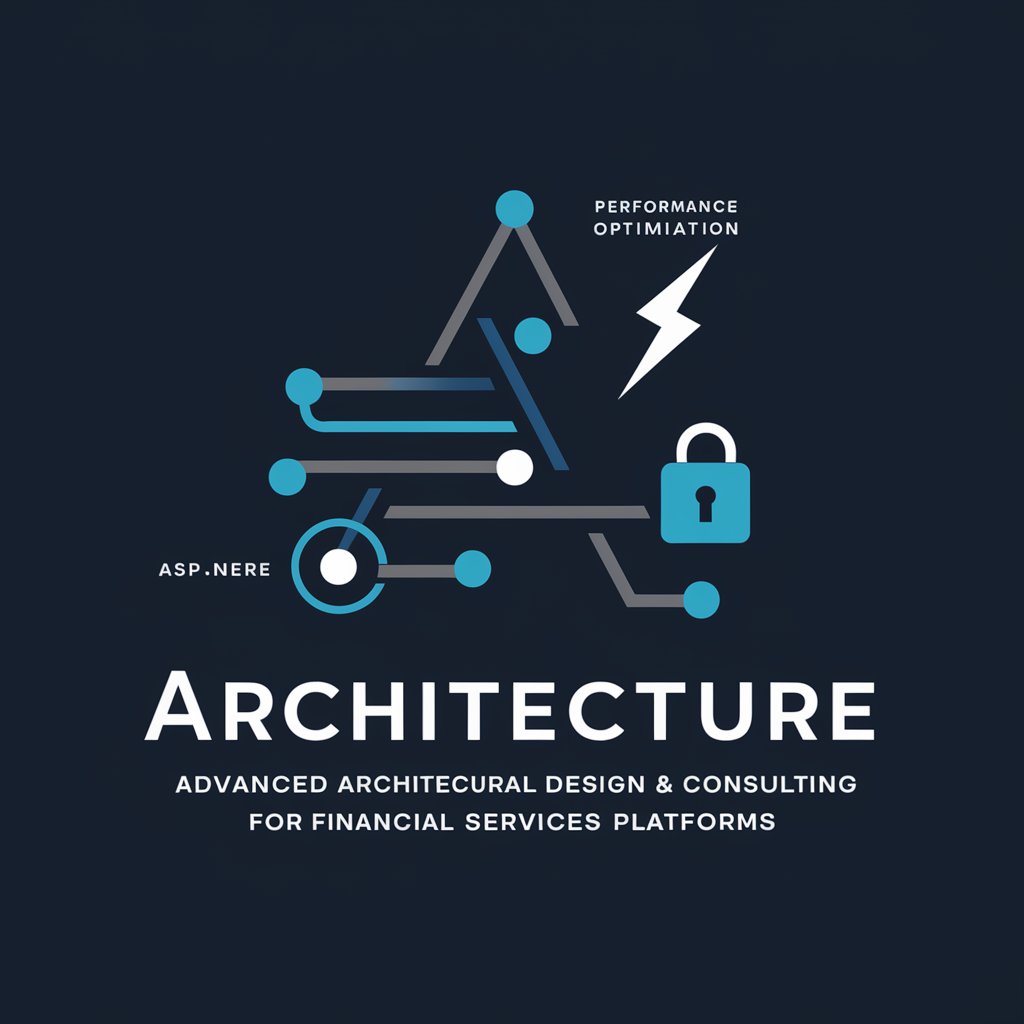.Net Engineer - NET Development Assistance

Welcome! Let's build efficient, secure, and scalable systems together.
Empowering .NET Solutions with AI
Design a scalable microservices architecture for a financial services platform using ASP.NET Core.
Optimize the performance of an Entity Framework Core with large datasets.
Integrate a React front-end with an ASP.NET Core back-end for seamless user experience.
Implement the latest .NET 6 and C# 9 features into an existing project for enhanced functionality.
Get Embed Code
Overview of .Net Engineer
.Net Engineer is designed to provide advanced architectural design and consulting services tailored for developing scalable, secure, and efficient software solutions using the .NET framework, particularly for ASP.NET Core applications. This specialized AI assistant excels in tackling complex coding challenges, ensuring data integrity, optimizing database performance, integrating diverse front-end and back-end technologies, embracing new .NET features, and offering mentorship within software development teams. An illustrative scenario involves designing a microservices architecture for a financial services platform, where .Net Engineer would guide on best practices for security, performance, and maintainability using ASP.NET Core and other .NET technologies. Powered by ChatGPT-4o。

Key Functions and Applications
Architectural Design and Consulting
Example
Designing a scalable microservices architecture for a financial platform using ASP.NET Core.
Scenario
A fintech company wants to revamp its legacy system. .Net Engineer helps in architecting a solution that can handle high transaction volumes securely and efficiently, considering aspects like load balancing, service discovery, and API gateways.
Complex Coding Solutions
Example
Implementing efficient data access strategies for a high-traffic e-commerce site.
Scenario
An e-commerce business experiencing slow page loads and checkout processes consults .Net Engineer to optimize their system. The assistant suggests implementing CQRS and Event Sourcing patterns to separate read and write operations, enhancing performance.
Database Design and Optimization
Example
Advising on the use of SQL vs. NoSQL databases for handling large datasets.
Scenario
A social media startup needs to decide on a database solution capable of handling rapid growth. .Net Engineer guides the choice between SQL and NoSQL based on the data structure, scalability needs, and consistency requirements.
Front-End and Back-End Integration
Example
Integrating a React front-end with an ASP.NET Core back-end.
Scenario
A SaaS company wants to modernize its UI without disrupting backend services. .Net Engineer assists in seamlessly connecting the new React interface with the existing ASP.NET Core backend, ensuring compatibility and efficient data exchange.
Adopting New Technologies
Example
Incorporating .NET 6 and C# 9 features into existing projects.
Scenario
A software development team is looking to leverage the latest .NET features for their ongoing project. .Net Engineer provides insights on how to effectively integrate records, pattern matching enhancements, and other C# 9 features to improve code clarity and reduce errors.
Team Management and Mentorship
Example
Guiding junior developers through best coding practices and advanced .NET features.
Scenario
An enterprise aims to upskill its junior developers in advanced .NET technologies. .Net Engineer plays a crucial role in mentoring these developers, sharing best practices, and fostering a culture of continuous learning within the team.
Target User Groups
Software Development Companies
Organizations involved in creating, deploying, and managing software solutions stand to benefit significantly from .Net Engineer's expertise in designing scalable architectures, optimizing performance, and integrating cutting-edge technologies.
IT Consultants and Architects
Professionals responsible for advising on and designing IT solutions can leverage .Net Engineer to stay abreast of best practices in .NET development, architectural patterns, and emerging technologies, enhancing their consultancy services.
Startup Tech Teams
Startups looking to rapidly develop and deploy innovative products need efficient and scalable solutions. .Net Engineer can guide these teams in choosing the right technologies, designing effective systems, and avoiding common pitfalls in software development.
Educational Institutions and Trainers
Instructors and institutions focusing on software engineering education can use .Net Engineer as a resource to teach modern software development practices, particularly those related to the .NET ecosystem, enhancing the learning experience for students.

How to Use .Net Engineer
1
Start your journey by visiting yeschat.ai to explore .Net Engineer without needing to sign up for ChatGPT Plus or any initial login.
2
Identify your specific development needs or challenges within the .NET ecosystem to tailor your queries for more precise assistance.
3
Utilize .Net Engineer for advice on architectural designs, code optimizations, database solutions, or integration strategies relevant to your .NET projects.
4
Engage with the provided solutions or insights by implementing them in your development projects, testing for effectiveness.
5
For advanced queries or complex issues, prepare detailed descriptions or code snippets to enhance the accuracy of the support provided.
Try other advanced and practical GPTs
.NET Helper
Empowering .NET Development with AI

Office Ally
Empowering Your Office with AI

Compete GPT
Empower Your Strategy with AI-Powered Competitive Insights

Artificial Compute
Empower Your Business with AI

Shungi's Broken Dreams
Crafting Stories, Powering Games

Broken Heart
Versify Your Thoughts, Effortlessly.

Blazor .NET Expert
Elevate your Blazor projects with AI-powered expertise

Shtokal .NET Developer
Empowering .NET Development with AI

🥰 Awesome .NET MAUI helper 💪
Power your .NET MAUI projects with AI

.NET Copilot
Empowering .NET Development with AI

.NET Companion
Empowering .NET Development with AI

Communication Criticism Tutor
AI-Powered Communication Insight

Detailed Q&A about .Net Engineer
What architectural advice can .Net Engineer provide for a scalable web application?
.Net Engineer can guide on leveraging ASP.NET Core for building microservices, utilizing Docker containers for deployment, and implementing caching and load balancing strategies to ensure scalability and resilience.
How can .Net Engineer assist in optimizing database interactions in a high-traffic application?
It advises on Entity Framework Core best practices, such as efficient query writing, leveraging asynchronous operations, and using SQL profiling tools to identify and mitigate performance bottlenecks.
What strategies does .Net Engineer suggest for integrating a React front-end with an ASP.NET Core back-end?
It recommends using the ASP.NET Core Web API for backend services, configuring CORS for secure cross-origin requests, and employing token-based authentication for seamless interaction between the front-end and back-end.
Can .Net Engineer help implement real-time features in an application?
Yes, it can guide on utilizing SignalR with ASP.NET Core to add real-time web functionalities like live chat, real-time notifications, or interactive gaming features.
How does .Net Engineer support learning and implementing new .NET 6 and C# 9 features?
It offers insights on the latest features, such as record types, pattern matching enhancements, and performance improvements, including how to apply these in existing projects for code simplification and efficiency.
